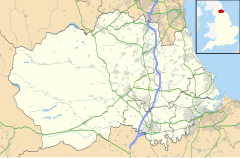Lanchester, County Durham
| Lanchester | |
|---|---|
| Lanchester shown within County Durham | |
| Population | 4,054 (2011) |
| OS grid reference | NZ165475 |
| Unitary authority | |
| Ceremonial county | |
| Region | |
| Country | England |
| Sovereign state | United Kingdom |
| Post town | DURHAM |
| Postcode district | DH7 |
| Dialling code | 01207 |
| Police | Durham |
| Fire | County Durham and Darlington |
| Ambulance | North East |
| EU Parliament | North East England |
| UK Parliament | |
Lanchester is a village and civil parish in County Durham, England, and was in the former district of Derwentside (1975–2009). It is 8 miles (13 km) to the west of the city of Durham and 5 miles (8 km) from the former steel town of Consett, and has a population of slightly more than 4,000, measured at the 2011 Census as 4,054.
Although there was a small drift mine on the edge of the village which closed in the 1970s, Lanchester's economy was mainly based on agriculture. It is now a residential village in which a number of housing estates have been developed since the late 1960s. The village centre now has three pubs and a small shopping centre. Thanks to the Lanchester Partnership, a cycle track was opened on 25 April 2009.
The earliest occupation on the site is the Roman auxiliary fort located just southwest of Lanchester (grid reference NZ159469. Longovicium lay on the Roman road leading north from Eboracum (York), known as Dere Street. It is situated between the forts of Vindomora (Ebchester) and Vinovia (Binchester). The fort dates to AD 140, covers almost 6 acres (2.4 ha), and housed around 1,000-foot soldiers and cavalry. The fort foundations are well preserved, but there has only been minor excavation work carried out in 1937.
Stone from the fort was used in the construction of All Saints' Church, which has a Roman altar (one of many found in or near the fort) which was found near the fort in 1893 in its porch.
Andrew Breeze has argued that the Battle of Brunanburh took place at the Roman fort of Longovicium. He interprets Brunanburh as meaning 'stronghold of the Browney.'
...
Wikipedia

